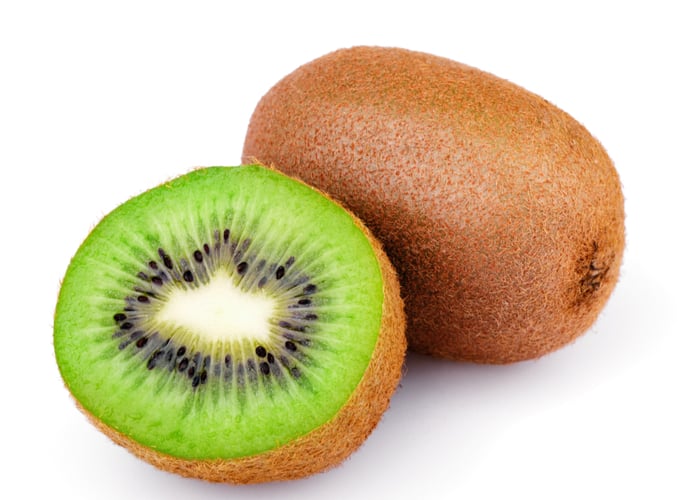Introduction to Feeding Chickens
Are you curious about expanding your flock’s culinary horizons? Can you treat your feathered friends to the tropical goodness of kiwi? can chickens eat kiwi Look no further! In this comprehensive guide, we’ll explore whether chickens can munch on this vibrant fruit and uncover the benefits, risks, and all the juicy details. So grab a perch, and let’s dive into the world of kiwis for chickens!
Benefits of Adding Kiwi to Chicken Diet
Adding kiwi to your chicken’s diet can bring a range of benefits to their overall health and well-being. Kiwi is a rich source of essential nutrients, including vitamins C, K, and E, as well as minerals like potassium and fibre. These nutrients support your chickens’ immune system, digestion, and egg production.
The high vitamin C content in kiwi can help boost your flock’s immune system, making them more resilient to common infections and diseases. Additionally, vitamin K promotes healthy bone development in chickens while aiding in blood clotting functions.
Furthermore, the fibre found in kiwi can support proper digestion in chickens by promoting gut health and preventing issues like constipation. The potassium content helps regulate fluid balance within the body, ensuring optimal hydration levels for your feathered friends.
Incorporating kiwi into your chicken’s diet can be a nutritious addition that contributes to their overall vitality and wellness.
Nutritional Value of Kiwi for Chickens
Kiwi is a delicious fruit for us and can offer significant nutritional benefits to your feathered friends. Packed with essential nutrients, kiwis are rich in vitamin C, which can help boost your chickens’ immune system and keep them healthy. Additionally, kiwi contains fibre that aids in digestion and promotes gut health in poultry.
The potassium content in kiwi supports proper muscle function and helps maintain electrolyte balance in chickens. Moreover, this vibrant fruit is a good source of antioxidants that can protect cells from damage caused by free radicals. Vitamin K in kiwi plays a role in blood clotting and bone health for your flock.
Including kiwi in their diet can give chickens various nutrients for their overall well-being. By offering this tropical treat occasionally, you can enhance the nutritional diversity of their feed intake and contribute to their vitality.
How Much Kiwi Should You Feed Your Chickens?

When it comes to feeding your chickens kiwi, moderation is key. While kiwi can be a nutritious treat for your flock, it’s important not to overdo it.
Start by introducing small amounts of kiwi into their diet and monitoring how they respond. Too much fruit, in general, can lead to digestive issues for chickens.
A good rule of thumb is to offer kiwi as an occasional snack rather than a staple food. This way, you can ensure that your chickens get a balanced diet with the necessary nutrients from their regular feed.
Chickens have relatively small stomachs compared to other animals, so too much fruit can fill them up without providing all the essential nutrients they need.
Remember to consider the size of your flock when determining how much kiwi to feed them – smaller flocks may not need as much as larger ones. Always prioritize a balanced diet for optimal chicken health and well-being.
Precautions and Risks of Feeding Kiwi to Chickens
Before introducing kiwi to your chickens’ diet, it’s essential to be aware of some precautions and risks associated with feeding them this fruit. While kiwi can offer various health benefits, excessive consumption may lead to digestive issues in chickens.
One precaution is to remove the fuzzy skin of the kiwi before feeding it to your flock. Chickens may have difficulty digesting the tough outer layer, potentially causing blockages or choking hazards.
Additionally, moderation is key when incorporating kiwi into their diet. Overfeeding any new food item can upset their stomachs and disrupt their overall nutritional balance. It’s important not to replace staple foods like grains and seeds with too much fruit.
Monitor your chickens’ response after introducing kiwi into their diet. Look for any signs of gastrointestinal distress, such as diarrhoea or changes in appetite. If you notice any adverse reactions, limit or remove kiwi from their feeding routine.
Remember that while offering a variety of fruits and vegetables can enrich your chickens’ diet, always do so in moderation and with caution.
Other Fruits and Vegetables Safe for Chickens to Eat
When it comes to feeding your chickens, variety is vital. Aside from kiwi, plenty of other fruits and vegetables can make a great addition to their diet.
Fruits like berries, apples, melons, and bananas are safe for chickens to eat in moderation. Vegetables such as spinach, kale, carrots, and cucumbers provide essential nutrients for your feathered friends.
Remember to introduce new foods gradually and monitor how your chickens react. Some may have preferences or sensitivities to certain foods.
Avoid feeding them anything toxic, like avocado pits/seeds or unripe tomatoes. Stick with fresh produce and avoid giving them leftovers that might be spoiled or moldy.
Experimenting with different treats can keep your flock happy and healthy while adding some excitement to their daily feedings!
Conclusion: A Balanced Diet Is Key
Ensuring your chickens have a balanced diet is essential for their health and well-being. In addition to providing them with a variety of fruits, vegetables, grains, and proteins, it’s important to monitor their intake to prevent overfeeding or deficiencies.
By incorporating nutritious options like kiwi into their diet in moderation, you can offer them a tasty treat while boosting their vitamin C intake. Remember that diversity is critical when feeding your feathered friends – rotating different foods ensures they receive all the necessary nutrients.
Observing your chickens’ behaviour and physical condition can give you valuable insights into whether they thrive on their current diet. Look for any signs of digestive issues or nutrient imbalances and adjust accordingly.
Remember, happy and healthy hens lay better eggs! So, experiment with various food options to keep your flock content and nourished.
FAQs
Q: Can chickens eat kiwi skin?
A: It is best to remove the skin before feeding kiwi to chickens as it can be difficult for them to digest.
Q: Are there any other fruits that are harmful to chickens?
A: Some fruits like avocados and citrus can be toxic to chickens and should be avoided.
Q: How can I introduce new foods like kiwi to my chickens’ diet?
A: Introduce new foods gradually and observe how your chickens react. Start with small amounts and monitor their health.
Also read”can chickens eat kiwi







One thought on “Can Chickens Eat Kiwi? A Comprehensive Guide for Poultry”